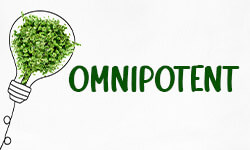
Sometimes students use words in their academic writing simply because they are popular without knowing their definitions or origins, and in some instances, they may even misspell them. The focus of this article is on the term “omnipotent,” often misused in various contexts. It seeks to offer a comprehensive explanation of “omnipotent,” covering both its accurate spelling and its historical origins.
Definition of “omnipotent”
The term “omnipotent” refers to having unlimited power or authority. In many religious contexts, it is used to describe a deity or divine being who has the power to do anything, without any limitations. This concept of omnipotence is often associated with the idea of a god who is all-powerful and can perform any action or create any outcome, according to their will. In a broader sense, “omnipotent” can be applied metaphorically to entities or individuals perceived as having significant power or influence, though in such cases it’s understood as a hyperbolic or exaggerated expression rather than a literal fact.
Use of “omnipotent” in a sentence
In English, “omnipotent” operates grammatically as a noun and an adjective. This term entered English usage to describe an entity, especially a deity, with unlimited power or authority. Over time, it has become a key concept in theology, philosophy, and even in more general discussions about power and capability.
How to spell “omnipotent” correctly
The word “omnipotent” is frequently misspelled as “omipotent”, “ohmnipotent”, or “omnipotante” primarily because of the phonetic confusion and the unfamiliar prefix “omni-.” The blending of the “n” and “m” sounds and the subtlety of the “t” sound can lead to phonetic misinterpretations and, consequently, misspellings. It originates from the Latin word “omnipotens,” which is derived from two Latin components:
- “Omni-” – meaning “all” (which is a prefix used to denote universality or totality in a certain aspect.)
- “Potens” – meaning “powerful” (which comes from “potere,” signifying the ability or capacity to do something.)
“Omnipotent” literally translates to “all-powerful” or “having all power”.
Correct spelling
omnipotent
Wrong spelling
omipotent
ohmnipotent
omnipotante
Synonyms for “omnipotent”
Using synonyms in your academic writing can help you avoid repetition and redundancy, and make your language more diverse and detailed. This is especially helpful for words like “omnipotent.” For a more profound understanding, here are four examples:
| Synonym | Examples |
| All-powerful | The deity in the story was omnipotent, able to do anything at will. |
| The deity in the story was all-powerful, able to do anything at will. | |
| Supreme | The ruler was considered omnipotent, having complete control over the kingdom. |
| The ruler was considered supreme, having complete control over the kingdom. | |
| Almighty | In their culture, they worshiped an omnipotent deity, believed to have unlimited powers. |
| In their culture, they worshiped an almighty deity, believed to have unlimited powers. | |
| Preeminent | The king is omnipotent, unrivaled in his power. |
| The king is preeminent, unrivaled in his power. |
FAQs
“Omnipotent” is derived from the Latin words for total (omni) and power (potent). It is commonly used for deities, but can also apply to an exaggerated definition of power.
Being “omnipotent” refers to having unlimited power or authority, while “omniscient” means to have complete, unlimited knowledge.
To be “omnipotent” means to have unlimited power or authority.
Antonyms for “omnipotent” include the following:
- Powerless
- Weak
- Impotent
- Helpless
- ✓ Free express delivery
- ✓ Individual embossing
- ✓ Selection of high-quality bindings
